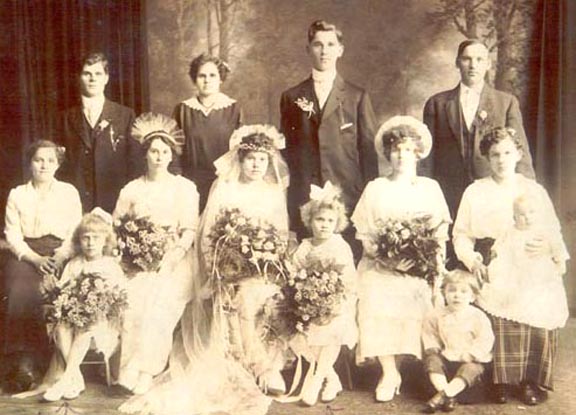 |
 |
| Ron's paternal grandparents |
| on their wedding day (circa 1914) |
| Front Row (fourth from left): Angeline (Glowiak) Karpinski (1892-1982) |
| Back Row (third from left): Jan (later John) Karpinski (1894-1972) |
| As a young woman in Gdynia, Poland, Angeline GLowiak played an active role in union politics. In 1915, not long after their wedding, |
| she and husband Jan emigrated to The United States, settling in the Midwest metropolis of Chicago, Illinois. There, on the north side |
| of town in a predominantly Polish neighborhood, they had a new two-story house built on a vacant lot at 2819 Melvina Avenue. In their |
| new home, the couple raised six children: Stephen Francis (1917-1944); Edward Joseph (1919-1986); Emily Sophie (1921-2006); Irene |
| Florence (1923-1988); Joseph Stephen (1927-1998); Jeanne Agnes (1935-2015). For many years, Jan worked for a local ice company. |
| In an era before home electric refrigerators, Jan delivered heavy blocks of ice door-to-door, carrying them on his shoulder from the street |
| into each customer's kitchen. Angeline and Jan lived out their remaining years in Chicago, rarely venturing beyond the city limits. |
| Late in World War II, Jan and Angeline's oldest son, Stephen Francis Karpinski, a sergeant in the U.S. Army infantry, fell in battle at |
| Luxembourg in September 1944. As a result of his courageous actions, he was posthumously awarded a third Purple Heart and the |
| Bronze Star Medal for valor. Angeline never recovered from the loss of her first-born child and refused to spend any of the government |
| life insurance money she and Jan had been paid. "That's Stevie's money," she insisted. "He's coming home some day." |
| In 1948, following normal policy, government officials contacted Jan Karpinski and offered to repatriate his son's remains from the U.S. |
|
War Monuments Cemetery in Luxembourg, Belgium, and re-inter them at Rock Island National Cemetery, located in Moline, Illinois, |
|
not far from Chicago. Jan quietly agreed. He never told his wife. |